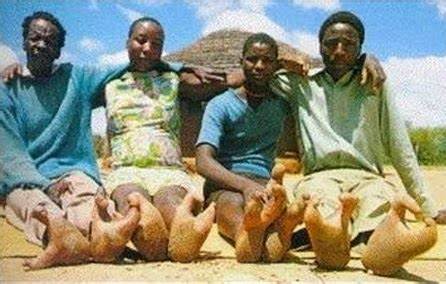The Vadoma people also known as the Ostrich Tribe are the only indigenous hunter-gatherers in the Kanyemba region in the north of Zimbabwe. They are especially domiciled in the regions of Hurungwe and Chipuriro, situated near the Mwazamutanda River, which serves as a tributary to the Zambezi River Valley.
The Dema and Korekore Shona-speaking tribes are called the Ostrich-footed Tribe due to the physical condition many of them inherited called Ectrodactyly -a rare condition in which the middle three toes are absent and the two outer ones are turned in. This gives their feet the resemblance of an ostrich hence the moniker, ‘the Ostrich-footed tribe.’
However, the Vadoma people do not see their condition as a disability, rather they see it as a strength. They have a unique ability to climb trees better and faster than a regular human being with complete five toes. They have been able to maintain a formidable community by forbidding members of the tribe from marrying outside. As a result, the Vadoma people practice a form of endogamous marriage, favoring bilateral cross-cousin unions. This also mitigates the spread of the condition to other tribes.
According to the Vadoma mythology, their ancestors emerged from a baobab tree. They have a long history of living in the mountains, where they hunted, fished, trapped, and gathered wild fruits and roots.
Read Also: Wolof Tribe: An Exploration Of Their Culture And Tradition
Prior to the European colonization of Africa, the Vadoma resisted incorporation into the Korekore Shona kingdom of Mutapa. This resulted in little access to fertile land, and the Vadoma have continued to be dispossessed of their land even after Zimbabwe’s independence. This has made them Zimbabwe’s only non-agricultural society, and they have been stereotyped as “Stone Age cave-dwellers.”
In recent years, the Vadoma have been threatened by game rangers due to a crackdown on poaching. Many have abandoned their hunter-gatherer lifestyle and moved to the lowlands. Today, many Vadoma families live settled lives as semi-foragers, building houses on wooden platforms to avoid predators. They are reluctant to wear textile fabrics, and recently, the Seventh-day Adventist Church built Mariga Primary School to educate vaDoma children.


